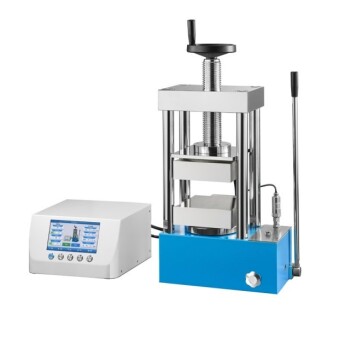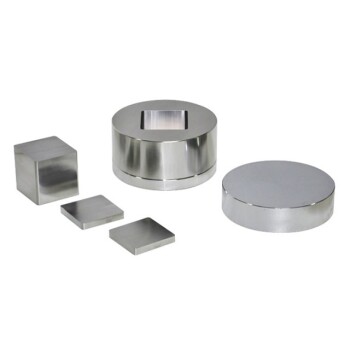The versatility of a laboratory hydraulic press stems from its fundamental ability to generate and apply highly controlled, consistent force. This core capability allows it to be adapted for a vast range of tasks, from routine sample preparation for spectroscopy to advanced materials science research, making it one of the most valuable multi-purpose tools in a modern lab.
A hydraulic press is more than just a piece of equipment; it is a platform. Its true value is not in any single function, but in its adaptability to solve diverse experimental challenges by simply changing its tooling and adjusting its precise application of force.

The Foundation of Versatility: Precise Force Control
The entire utility of a hydraulic press is built upon a simple physical principle, leveraged to provide unparalleled control for scientific applications.
Pascal's Principle in Action
A hydraulic press uses an incompressible fluid (typically oil) to multiply force. A small force applied to a small piston generates immense pressure that is transmitted throughout the fluid, creating a large, easily-regulated force on a much larger piston.
The Power of Repeatability
This mechanism allows for the precise and consistent application of pressure. For laboratory work, this means every sample can be prepared under identical conditions, and every material test can be conducted according to exact parameters, dramatically improving the reliability and repeatability of results.
Core Laboratory Applications: From Preparation to Discovery
The ability to apply controlled force unlocks a wide array of critical laboratory functions, making the press a central workhorse for many disciplines.
Essential for Sample Preparation
Many analytical techniques require samples to be in a specific form. A hydraulic press is the standard tool for creating thin, uniform pellets from powdered material, such as KBr pellets for FTIR spectroscopy or pressed powder samples for XRF analysis. This ensures consistent sample density and thickness, which is critical for accurate measurements.
Characterizing Material Properties
In materials science, a press is indispensable for testing mechanical properties. By subjecting a material to a known force, researchers can measure its strength, durability, and stress-strain behavior. This data is crucial for quality control, new material development, and fundamental research.
Simulating Extreme Environments
Researchers use hydraulic presses to investigate how substances behave under immense pressure. This simulates conditions found in extreme environments, such as deep-sea pressures or the intense forces within the Earth's crust, providing invaluable insights into material stability and phase transitions.
Prototyping and Fabrication
Beyond analysis, presses are used in small-scale fabrication. A key example is prototyping microfluidic devices, where layers of polymer can be bonded or embossed with high precision to create intricate channel networks for "lab-on-a-chip" applications.
Understanding the Trade-offs and Practical Realities
While versatile, the effectiveness of a hydraulic press depends on several practical factors that must be considered.
Tooling Is Everything
A press itself only provides the force. Its versatility is directly tied to the availability of appropriate tooling, such as different-sized pellet dies, heating platens, and fixtures for material testing. The press is the engine, but the tooling determines the task it can perform.
Manual vs. Automated Control
Manual presses are simple, cost-effective, and robust, making them ideal for routine sample preparation. Automated presses offer pre-programmable pressure cycles, which provide superior control and repeatability for sensitive materials research but come at a higher cost.
Durability and Maintenance
Well-built presses with high-quality components are known for their stability and long-term use, which reduces downtime and maintenance costs. However, due to the high forces involved, regular inspection and adherence to safety protocols are non-negotiable.
Making the Right Choice for Your Lab
To select the right press, you must align its capabilities with your primary research goals.
- If your primary focus is routine spectroscopic analysis (FTIR, XRF): A simple, cost-effective manual press is a reliable workhorse for consistent pellet making.
- If your primary focus is materials science R&D: An automated press with programmable force control offers the superior repeatability needed for characterizing material behavior.
- If your primary focus is exploratory research with varied needs: Prioritize a model that supports a wide range of tooling and accessories to maximize its future adaptability.
Ultimately, a hydraulic press empowers a laboratory by consolidating multiple mechanical tasks into one precise and reliable platform.
Summary Table:
| Key Aspect | Description |
|---|---|
| Precise Force Control | Uses Pascal's Principle for consistent, repeatable pressure application. |
| Sample Preparation | Essential for creating uniform pellets for FTIR and XRF analysis. |
| Materials Testing | Measures strength, durability, and stress-strain behavior in research. |
| Simulation & Fabrication | Simulates extreme environments and aids in prototyping microfluidic devices. |
| Tooling & Automation | Versatility depends on dies and platens; manual or automated options available. |
Ready to enhance your lab's capabilities with a versatile hydraulic press? KINTEK specializes in lab press machines, including automatic lab presses, isostatic presses, and heated lab presses, designed to meet your specific needs in sample preparation, materials testing, and more. Our solutions deliver precise force control, improved repeatability, and adaptability for various applications—helping you achieve reliable results and boost efficiency. Don't wait to optimize your workflow—contact us today to discuss how we can support your laboratory goals!
Visual Guide

Related Products
- Laboratory Hydraulic Press 2T Lab Pellet Press for KBR FTIR
- Manual Heated Hydraulic Lab Press with Integrated Hot Plates Hydraulic Press Machine
- Laboratory Hydraulic Press Lab Pellet Press Button Battery Press
- Manual Laboratory Hydraulic Press Lab Pellet Press
- Automatic Laboratory Hydraulic Press Lab Pellet Press Machine
People Also Ask
- Why must a laboratory hydraulic press be used for pelletizing samples for FTIR? Achieve Precision in Spectral Data
- What role does a high-pressure laboratory hydraulic press play in KBr pellet preparation? Optimize FTIR Accuracy
- How are hydraulic presses used in spectroscopy and compositional determination? Enhance Accuracy in FTIR and XRF Analysis
- How do hydraulic press machines ensure precision and consistency in pressure application? Achieve Reliable Force Control for Your Lab
- How is a laboratory hydraulic press used for Tb(III)-Organic Framework FT-IR samples? Expert Pellet Pressing Guide



















